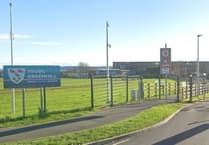The Tenby Arts Club season finished last Friday with an excellent performance from the Memphis 7, a traditional jazz band who have become regular and welcome visitors. They play jazz that is in the main from 1900 to 1940. There are two founder members still playing with the group since its founding in 1970, Eric Swift, the leader and trumpet player, and Pete Berry on the double bass. Jeff Salter on clarinet and saxophone, John Gill on banjo and guitar, Don Thomas on piano, and Pete Locke on trombone completed the ensemble.
After a slight delay due to the roadworks between Swansea and Tenby, the evening started with a number from 1919 by Clarence Williams, 'Baby, won't you please come home'. A well-loved Irving Berlin number from 1911 followed, namely 'Alexander's Ragtime Band'. A favourite with dance and jazz bands for the last 100 years!
The tempo rose with Spencer Williams's 1926 tune, 'I've found a new baby'. John Gill provided vocals for a song originally written for a now unknown musical by Joseph Howard in 1909, 'I wonder who's kissing her now'. 'Mood Indigo' followed, a Duke Ellington number played in tribute to founder member Ian Jamieson, who passed away at the end of last year, but had previously played clarinet and saxophone, as well as doing the introductions and vocals.
Notwithstanding his Swansea roots, Eric Swift gave a marvellous Oxbridge accent for the vocals in the Cliff Friend number 'Yes, yes, in your eyes' from 1916, later a big hit for Dean Martin. Next came the 'Savoy Blues', written in 1927 by jazz trombonist Edward 'Kid' Ory who played with Louis Armstrong.
A hit for Oliver Wallis in 1918, 'Hindustan' was a fast number, and was accompanied by the swanee or slide whistle played by Pete Locke, who commented that with four octaves in the space of seven inches, it was a difficult instrument to be entirely accurate on. A spiritual by Albert Brumley, one of the 414 he wrote, 'I'll fly away' from 1929 had a haunting melody, and vocals from Pete Locke.
Out of their usual date range, a song from 1956 followed. Written by Cole Porter to be sung by Bing Crosby in 'High Society', 'Samantha' was later a hit for Kenny Ball and his Jazzmen, and was sung for us by John Gill. A 1910 tune by Jean Schwartz, a Hungarian-born American songwriter, followed, 'Chinatown, my Chinatown'.
The set finished appropriately enough with the 1930 jazz standard 'Bye Bye Blues'. The audience showed their appreciation of a superb finalé to the season, and was pleased to chat with the band over refreshments.
The chairman was saddened to have to announce that long-time member, twice former chairman and writer of many Christmas shows, Mary Smith died on March 25, and a minute's silence was held in memory of her. The annual general meeting will be on April 11 at St. Johns Church Hall at 7.30 pm, and the next season will commence on the first Friday in October.
A.D.


.jpeg?width=209&height=140&crop=209:145,smart&quality=75)


Comments
This article has no comments yet. Be the first to leave a comment.